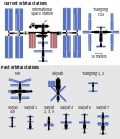Lunar Orbital Station

a. Docking ports
b. Solar panels
The Lunar Orbital Station (Russian: Лунная Орбитальная Станция, romanized: Lunnaya Orbital'naya Stantsiya; LOS) is a proposed Russian space station which would orbit around the Moon.[1] The design was presented in 2007 at a conference at the Gagarin Cosmonaut Training Center in Star City. It is one of the two parts of the planned Russian lunar infrastructure, the other part being a base on the surface of the Moon.
LOS would have six docking ports, a high-power antenna for communications, maneuvering and attitude control engines, solar panels and a robotic arm. The station components would be launched atop a super heavy version of the Angara rocket.
Russia has expressed discontent with its role in the international Lunar Gateway, which prompted the country to go ahead with the planning of its own lunar station. The launch of the first LOS module is proposed for 2025.[citation needed] Other reports state that NASA now accepted Russia's full participation in the international Gateway.[citation needed] In October 2020, Dmitry Rogozin, director general of Roscosmos, said that the Lunar Gateway program is too “U.S.-centric” for Roscosmos to participate in.[2] In January 2021, Roscosmos announced that it will not participate in the program.[3]
References
[edit]- ^ "Lunar Orbital Station, LOS". Russian Space Web. Archived from the original on 3 March 2016. Retrieved 31 January 2016.
- ^ "Russia skeptical about participating in lunar Gateway". SPACENEWS. 12 October 2020. Retrieved 25 January 2021.
- ^ ""Роскосмос" подтвердил выход из лунного проекта Gateway". Interfax. 25 January 2021. Retrieved 25 January 2021.

